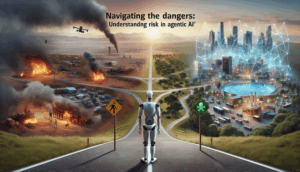Introduction: The Rise of AI Agents in 2025
In 2025, AI agents have become pivotal in revolutionizing workflows and decision-making across various sectors. Organizations are leveraging advanced tools like Microsoft 365 Copilot and IBM’s watsonx.ai to automate processes ranging from HR support to financial reconciliation. These AI-driven systems not only enhance productivity but also minimize human error, allowing employees to focus on more strategic tasks.
Industries like finance, healthcare, and agriculture are particularly benefiting from AI integration. For instance, financial institutions are employing AI agents to streamline operations, enhance customer service, and ensure compliance, thus transforming their business models into frictionless systems conducive to innovation and growth. In agriculture, companies are utilizing AI to digitize traditionally paper-based processes, achieving up to a 50% reduction in operational incidents and significantly enhancing predictive analytics capabilities.
Moreover, as highlighted by the AI Impact Awards 2025, AI tools are seen as instrumental in addressing some of humanity’s most urgent challenges, showcasing how these agents can be pivotal for both company efficiency and societal impact. Thus, the emergence of AI agents as indispensable tools in 2025 is shaping a future where decision-making processes are not only faster but also more informed and efficient.
For further insights into how AI agents are transforming industries, explore our comprehensive guide on The Rise of AI Agents and learn about the technologies driving these advancements at The AI Agent Tech Stack.
Top Free AI Agent Tools: A Detailed Breakdown
In 2023, various free AI agent tools emerged as indispensable resources for businesses and individuals alike. Below, we delve into some of the standout options from major players like OpenAI and Microsoft, highlighting their unique features and functionalities.
1. OpenAI’s GPT Models
OpenAI has dominated the AI landscape with its GPT (Generative Pre-trained Transformer) models, particularly ChatGPT. These models are embedded into various applications to enhance user interaction and automate tasks. Notable capabilities include natural language understanding and generation, allowing users to create content, answer inquiries, and assist with coding. The versatility of GPT has made it a staple tool for developers and creative professionals alike.
2. Microsoft’s AI-Driven Innovations
Microsoft has integrated AI deeply into its suite of products, especially through tools like Microsoft 365 Copilot and GitHub Copilot. These tools employ AI to automate routine tasks such as data analysis, document summarization, and coding assistance. For instance, Microsoft 365 Copilot can help draft emails or create presentations, making productivity more efficient. As noted in an internal memorandum, the company believes that “using AI is no longer optional,” emphasizing the growing reliance on AI in workplace settings.
3. Cohere’s All-in-One AI Agent
Cohere offers a comprehensive platform designed to minimize digital busywork through intelligent automation. Its AI agents can streamline workflows by integrating multiple tools into a single interface, thereby enhancing operational efficiency.
4. IBM’s watsonx.ai
IBM continues to innovate with its watsonx.ai tool, which is designed for enterprise applications. It enables businesses to build and deploy AI applications tailored to their specific needs, supporting areas from customer service to risk management.
5. Google’s AI Tools
Google additionally, powered by DeepMind’s advancements, incorporates AI agents into its software to optimize workflows across various services like Google Workspace, ensuring that tasks such as scheduling and document management are automated effectively.
6. AutoGPT and Specialized AI Solutions
Emerging in popularity, AutoGPT helps users harness the potential of AI through a user-friendly interface that allows for tailored solutions across different domains, from marketing to project management. As AI technology continues to evolve, these tools are expected to transform how we interact with digital systems, driving productivity and innovation in numerous sectors. For a look at more tools and their capabilities, visit our comprehensive guide on the best free AI agent tools to supercharge your productivity.
Unique Use Cases: AI Agents in Action
AI agents are transforming industries through innovative applications that enhance efficiency, creativity, and customer engagement. Here’s a look at some unique use cases across different sectors:
1. Healthcare
AI agents are revolutionizing the healthcare landscape. They can autonomously schedule appointments, generate detailed medical reports, and monitor patients without human intervention. For example, an agent can cross-reference patient data and medical images to create diagnostic reports, streamlining the workflow for healthcare professionals [Source: Forbes].
2. Finance
In the accounting sector, Intuit has introduced AI agents for QuickBooks that assist businesses by automating tasks such as financial reconciliations and payroll management, enabling accountants to focus on strategic decision-making rather than mundane tasks [Source: Accounting Today].
3. Customer Support
Companies are deploying AI agents to enhance customer interactions. Tools like Microsoft 365 Copilot automate responses to customer inquiries, manage returns, and provide real-time support, significantly improving customer service efficiency [Source: Mashable].
4. Hospitality
The hotel industry is leveraging AI agents to manage bookings and guest communications. These agents act like a digital staff member, handling everything from guest messaging to rate management directly through an automated system, allowing for enhanced service while reducing operational costs [Source: Hospitality Net].
5. Retail
AI agents are being used to optimize inventory management and supply chain operations in retail sectors. By using predictive analysis, these agents can streamline stock ordering processes, enhancing efficiency and reducing waste [Source: Devdiscourse].
These applications demonstrate the diverse potential of AI agents, making them indispensable tools for businesses looking to enhance their operational capabilities and customer experiences. For deeper insights on how AI agents are shaping various industries, check out our article on the rise of AI agents.
Future Trends: Where AI Agents Are Heading
The future of AI agents is poised for remarkable advancements, integrating more complex task automation and personalized support across various sectors. One major trend is the development of multi-modal AI, which allows for seamless interaction between different types of data. For instance, AI agents can manage reservations and provide customer support by utilizing real-time information pulled from various sources, significantly enhancing user experience in industries like hospitality [Source: Hospitality Net].
Moreover, organizations are increasingly deploying sophisticated tools like Microsoft 365 Copilot and IBM’s watsonx.ai, streamlining processes from HR operations to customer service. These platforms replace mundane tasks with intelligent automation, thereby increasing operational efficiency [Source: Mashable].
However, as the use of AI agents grows, so does the necessity for robust cybersecurity measures. With AI agents operating autonomously, organizations must collaborate with security teams to mitigate risks such as data tampering and ensure secure operational environments. This requirement to bake security into AI deployment is a new responsibility that will redefine digital infrastructures [Source: Technology Decisions].
In conclusion, the future of AI agents revolves around their integration into everyday business practices, bolstered by advancements in technology that promise heightened efficiency and tailored experiences, while also necessitating enhanced security protocols to safeguard these intelligent systems. For more on how AI agents are transforming industries and their potential impacts, check out our article on The Rise of AI Agents.
Getting Started with Free AI Agents: A Practical Guide
Choosing a free AI agent can propel your productivity and automate everyday tasks. Here’s a straightforward process to help you choose and implement the ideal AI tool for your needs.
Step 1: Identify Your Goals
Start by determining what tasks you wish to automate. This could be anything from managing emails and scheduling appointments to data analysis and customer service responses. Understanding your goals can help narrow down options.
Step 2: Explore Popular Free AI Agent Tools
There are numerous AI agents available, each with unique features:
- OpenAI’s ChatGPT: Great for text-based tasks and customer interaction automation.
- IBM’s Watson Assistant: Focused on creating conversational agents for customer service.
- Microsoft 365 Copilot: Enhances productivity across Microsoft applications by integrating AI for document generation and summarization.
- Cohere’s North: An all-in-one AI platform designed to reduce digital busywork through intelligent automation. [Source: Mashable].
Step 3: Evaluate Ease of Integration
Look for tools that seamlessly integrate with your existing systems. Consider platforms like n8n, which allow for easy connections between various apps and services without the need for extensive coding. Check out more on using n8n for automation here.
Step 4: Implement Iteratively
Begin using the chosen AI agent in a limited capacity. Monitor its performance and gather feedback from your team or users, adjusting the implementation as necessary. This iterative approach helps avoid overwhelming changes while maximizing user adaptation.
Tips for Maximizing Impact
- Training and Support: Ensure your team has the necessary training to use the AI tools effectively. Provide resources for common issues they may face.
- Feedback Mechanism: Set up a system to gather user feedback to continually improve the efficacy of the AI agent.
- Monitoring and Adjustments: Regularly review the AI’s performance against your initial goals and adjust its parameters as needed to enhance results.
Key Considerations for Success
- Data Privacy and Security: Understand the data policies of your chosen AI agents, especially when handling sensitive information. Implement robust security measures to safeguard data.
- Future Scalability: Select tools that not only meet your current needs but can also scale as your workload increases. Tools like AutoGPT provide various features to evolve alongside your requirements [Source: Agent Mode AI].
Implementing a free AI agent can transform your workflow—maximize the benefits by understanding your requirements, selecting the right tools, and being open to iterative improvements.
Sources
- Accounting Today – Intuit Debuts AI Agents for QuickBooks
- Business Insider – Microsoft Internal Memo: Using AI is No Longer Optional
- Devdiscourse – Revolutionizing Workforce Efficiency with Agentic Automation
- Diginomica – Paper AI: How Samsara’s Helping Companies Digitize
- Mashable – 7 AI Agents Widely Used by Companies Right Now
- Forbes – The Amazing Ways AI Agents Will Transform Healthcare
- Hospitality Net – AI Agents and the Future of Digital Hospitality
- Agent Mode AI – What Can AI Agents Actually Do? 7 Real Tasks They’re Handling Today
- Agent Mode AI – The Rise of AI Agents Transforming Tasks and Industries
- Agent Mode AI – The AI Agent Tech Stack: What Powers Your Digital Teammate?
- Technology Decisions – AI Agents: Securing the Artificial Workforce
- Agent Mode AI – AutoGPT v3: Feature Breakdown Transforming AI Interaction in 2025
- Agent Mode AI – Beginner’s Guide to n8n
- FinTech Futures – Banking Business Models in a Frictionless World
- Newsweek – AI Impact Awards 2025: Science and Engineering



